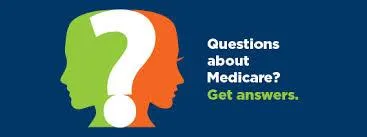
Medicare Q & A
"The groundwork of all happiness is health." — Leigh Hunt
Medicare Q&A: Your Guide to Navigating Medicare at 65
Turning 65 brings a major milestone: becoming eligible for Medicare. If you're unsure about how Medicare works or which plan to choose, this guide will answer the most common questions people have when enrolling in Medicare for the first time.
Q: What is Medicare, and when am I eligible?
A: Medicare is a federal health insurance program primarily for people 65 and older, although younger people with disabilities may also qualify. You become eligible for Medicare when you turn 65, and your initial enrollment period starts three months before your 65th birthday and ends three months after.
Q: What are the different parts of Medicare?
A: Medicare is divided into several parts:
Part A: Covers inpatient hospital stays, skilled nursing facilities, and some home health care.
Part B: Covers outpatient care, doctor visits, preventive services, and medical supplies.
Part C (Medicare Advantage): An alternative to Original Medicare, offered by private insurance companies. It includes Parts A and B, and usually Part D, with added benefits like vision, dental, and hearing.
Part D: Prescription drug coverage.
Q: How do I know if I should choose Original Medicare or Medicare Advantage?
A: It depends on your healthcare needs and preferences:
Original Medicare (Parts A & B): Offers more freedom in choosing doctors and hospitals, but you may need supplemental insurance (Medigap) for costs like copays, coinsurance, and deductibles.
Medicare Advantage (Part C): Often includes additional benefits, like vision, dental, and hearing, but you’ll be limited to a network of doctors and hospitals.
Q: What is Medigap, and do I need it?
A: Medigap (Medicare Supplement Insurance) is designed to cover the "gaps" in Original Medicare, such as copayments, coinsurance, and deductibles. You might consider Medigap if you choose Original Medicare and want additional financial protection. However, Medigap isn’t necessary if you opt for Medicare Advantage, as those plans often have built-in cost-sharing protections.
Q: Do I need Medicare Part D for prescription drug coverage?
A: If you take prescription medications regularly, you’ll want to enroll in a Medicare Part D plan. Even if you don't take medications now, enrolling in Part D when you're first eligible helps avoid late enrollment penalties.
Q: What are Medicare late enrollment penalties, and how can I avoid them?
A: If you don't sign up for Medicare Part B or Part D during your initial enrollment period, you could face late enrollment penalties, which increase the longer you delay. To avoid penalties, make sure you enroll in Medicare on time unless you have other qualifying coverage, such as employer health insurance.
Q: Can I keep my employer coverage after I turn 65?
A: In some cases, yes. If you're still working or have coverage through your spouse's employer, you may delay Medicare enrollment without penalties. However, you'll need to confirm with your benefits administrator how your employer coverage works with Medicare.
Q: How do I choose the right Medicare Advantage plan?
A: Compare plans based on:
Network of doctors: Ensure your preferred providers are in-network.
Prescription drug coverage: Check if your medications are covered.
Extra benefits: Look at additional services like dental, vision, or hearing.
Cost: Consider monthly premiums, deductibles, copays, and out-of-pocket maximums.
Q: What if I need help enrolling in Medicare or choosing a plan?
A: You can get help from:
Medicare.gov: Provides information about Medicare options and allows you to compare plans.
State Health Insurance Assistance Programs (SHIP): Offers free, personalized Medicare counseling.
Licensed Medicare agents: They can help you compare plans and find the best fit for your needs.
Q: Can I switch Medicare plans later if I’m not satisfied?
A: Yes. During the annual Medicare Open Enrollment period (October 15 to December 7), you can switch between Medicare Advantage and Original Medicare or change your Part D prescription drug plan.
Key Takeaways:
Enroll in Medicare during your initial enrollment period to avoid penalties.
Choose between Original Medicare and Medicare Advantage based on your health needs and preferences.
Don’t forget about prescription drug coverage and consider Medigap for additional protection.
Seek help if you’re unsure which plan is right for you.
